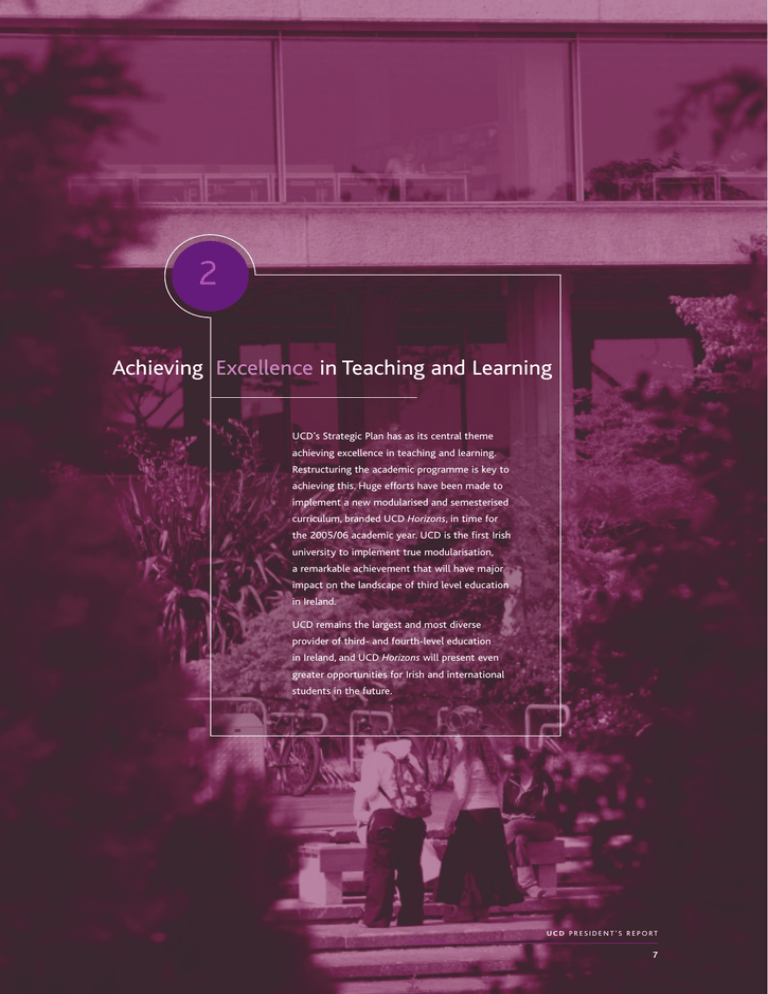Achieving Excellence in Teaching and Learning (pdf file)
advertisement

2 Achieving Excellence in Teaching and Learning UCD’s Strategic Plan has as its central theme achieving excellence in teaching and learning. Restructuring the academic programme is key to achieving this. Huge efforts have been made to implement a new modularised and semesterised curriculum, branded UCD Horizons, in time for the 2005/06 academic year. UCD is the first Irish university to implement true modularisation, a remarkable achievement that will have major impact on the landscape of third level education in Ireland. UCD remains the largest and most diverse provider of third- and fourth-level education in Ireland, and UCD Horizons will present even greater opportunities for Irish and international students in the future. U C D P R E S I D E N T ’ S R E P O RT 7 AC H I E V I N G E XC E L L E N C E I N T E AC H I N G A N D L E A R N I N G Student Numbers Introducing Modularisation and Semesterisation UCD Horizons Centre for Teaching and Learning U C D P R E S I D E N T ’ S R E P O RT 8 AC H I E V I N G E XC E L L E N C E I N T E AC H I N G A N D L E A R N I N G STUDENT NUMBERS HEA enrolment statistics show that 22% of the full-time undergraduate students and 26% of the full-time PhD students across the seven universities in 2003/04 were studying at UCD. UCD provides a uniquely broad range of programmes, with over 70 different entries in the CAO system, and over a dozen more planned for 2006. STUDENT ENROLMENTS 2003/04 2004/05 13,482 13,549 Undergraduate Certificate/Diploma programmes 908 1,700 Undergraduate visiting/exchange students 484 464 14,874 15,713 1,135 1,351 501 388 Taught Masters programmes 2,369 2,408 Postgraduate Certificate/Diploma programmes 1,619 1,765 110 137 5,734 6,049 20,608 21,762 Undergraduate Degree programmes Undergraduate students (total) Doctoral programmes Research Masters programmes Postgraduate occasional students Postgraduate students (total) TOTAL U C D P R E S I D E N T ’ S R E P O RT 9 AC H I E V I N G E XC E L L E N C E I N T E AC H I N G A N D L E A R N I N G INTRODUCING MODULARISATION AND SEMESTERISATION The most important educational action arising from the UCD Strategic Plan, 2005-2008, was the requirement for a fully modular, credit accumulation structure for all degree programmes. Modularisation is a key enabling step for a large number of other strategic goals, including curricular reform and educational innovation, widening participation, inter-institutional collaboration, international student mobility, and lifelong and flexible learning. The Strategic Plan describes four strategic imperatives for teaching and learning: • UCD must be renowned for excellence in teaching PROGRESS TO DATE Experts from across the university worked together to manage and integrate the many strands of an and learning, driven by excellence in research and extraordinary, university-wide change programme. scholarship The successful conclusion is a fully modular credit-based • UCD must recruit the best students and maximise their potential curriculum, delivered through new academic structures, which will be in place for all first year students in the 2005/06 academic year. • UCD must diversify the learning community and emphasise inclusive learning No other university as large and complex as UCD has achieved such a complete transformation in one • UCD must internationalise the learning experience. academic session. The new modular curriculum, imaginatively branded as UCD Horizons, has now become synonymous with increased student choice, flexibility and educational innovation (see page 12 for a description of UCD Horizons). This represents a huge achievement for the university. UCD Horizons also represents a major step towards the university’s stated aim of becoming a leading European university. It will play a key role in building relationships with international universities, while also attracting high calibre students. The impact of this success on the reputation of the university is immeasurable. The UCD Horizons programme required the introduction of numerous new measures to ensure Modularisation is the first step to achieving these a smooth and effective implementation of the new imperatives. Specifically, modularisation must: curriculum. These included: • Drive curricular reform at programme and module level • A new harmonised set of academic regulations • Meet the needs of students, increase student choice, and attract the brightest and best to UCD • Support the lifelong learning needs of all, including those requiring flexible or part-time education • Be compatible with European and international credit student mobility measures such as the Bologna process. governing all degree programmes • A complete reorganisation of all first year teaching to fit into the new modular framework • The university-wide adoption of a standard approach to degree programme structure, so that each year comprises 12 modules • The adoption of a new grading system, using letter grades from A+ to G- rather than percentages, and the introduction of the Grade Point Average (GPA) system to describe overall student performance U C D P R E S I D E N T ’ S R E P O RT 10 AC H I E V I N G E XC E L L E N C E I N T E AC H I N G A N D L E A R N I N G New central Student Services Desk • The agreement of standard grade descriptors which Second, modularisation will be used as a vehicle for will improve the transparency, validity and reliability curricular reform. A series of pilot projects across the of the grading process university will define and disseminate best practice in • Standard descriptors for all modules, clearly describing learning outcomes and assessment approaches, and acting as a stimulus to curricular reform • Central timetabling according to a framework which maximises student choice and optimises the use of teaching facilities • The development of a new online enrolment system, used by all first year students • The establishment of a central student services desk and call centre to support student enrolment and provide other key services to students • The establishment of new academic structures, in particular Programme Boards, to oversee the structure of degree programmes and the admission, progression and graduation of students the areas of: • Innovative and aligned assessment • Learning for large classes • Innovative learning approaches such as group learning, peer-facilitated learning and problem-based and project-based learning • Research-led learning • Credit for co-curricular activity, prior learning and work-based learning • Blended learning, combining eLearning delivery with traditional class meetings. Third, UCD has considerable expertise in the area of eLearning educational technology and the digital delivery of learning and information resources. We will work quickly to develop a coherent eLearning and eKnowledge • The establishment of Programme Offices to deliver strategy and action plan, building on current strengths administrative support to Programme Boards and to create a digital campus. This will establish UCD as a co-ordinate academic, administrative and pastoral leader in this important area. This will be accompanied supports to students. by a multi-annual plan for investment in learning FUTURE OBJECTIVES The programme for teaching and learning has four main goals for the next two years. First, there will be a concerted effort to realise the full potential of the UCD Horizons initiative. This will involve defining new fields of study and exciting subject combinations, as well as the launch of new degree programmes, enabling UCD to satisfy the needs of the students of today and the Ireland of the future. infrastructure and educational technology, so that all classrooms in UCD are fitted and equipped to the highest international standards. Finally, the ongoing enhancement of learning and teaching at UCD depends upon constant attention to quality. As a result, priority projects for the next academic session include the university-wide introduction of a teaching quality framework which will be integrated with the overall university quality programme. U C D P R E S I D E N T ’ S R E P O RT 11 AC H I E V I N G E XC E L L E N C E I N T E AC H I N G A N D L E A R N I N G UCD HORIZONS - A NEW DEGREE OF CHOICE Recruiting students at the UCD Open Days held annually in March UCD Horizons is the new modular, credit based, semesterised system which will be introduced to first year students for the 2005/06 academic year. Each full-time degree programme typically comprises 12 modules annually. To facilitate choice and flexibility there are three types of modules: • ‘Core’ modules are compulsory and must be taken as part of a designated degree programme In addition to the flexibility of choice, UCD Horizons also makes it easier for students to switch to and from other programmes in Ireland, Europe and beyond. The use of the internationally-recognised European Credit Transfer System (ECTS) promotes international • ‘Option’ modules are modules in which students have a limited element of choice – choosing from a prescribed list of alternatives in a given subject area • ‘Elective’ modules can be chosen from anywhere mobility of students. Periods spent studying abroad can now be fully recognised as part of a UCD programme, and international students visiting UCD will return with a clear credit value attached to their work. As semesters across the entire curriculum. are self-contained, students will find it easier to Together, core and option modules typically account undertake a period of international study for a semester for 10 modules, with students making up their quota as part of their degree programme. UCD Horizons may of 12 by choosing a further two elective modules. also give better options in terms of the length of time it takes to complete a degree. A ‘module descriptor’ provides students with an overview of what is involved in each module. It also specifies the level and credit value of the module, the learning outcomes, indicative curricular content and learning activities, the means by which learning outcomes will be assessed, an indication of expected student workload and any module dependencies (prerequisites, co-requisites, incompatible modules, exclusions, recommendations or requirements). U C D P R E S I D E N T ’ S R E P O RT 12 AC H I E V I N G E XC E L L E N C E I N T E AC H I N G A N D L E A R N I N G PRESIDENT'S TEACHING AWARDS The key to the success and reputation of teaching at UCD is the dedication and inventiveness of the academic staff. The President’s Teaching Awards for 2003 to 2005 recognised the achievement of five exceptional teachers. • Dr Eleni Mangina Dr Mangina has demonstrated a truly reflective approach to teaching in higher education. Eleni’s teaching philosophy is motivated by the very different needs of students from different backgrounds and cultures and she has drawn on her experiences in teaching students from Europe to the Far East. • Dr Maria Meehan Dr Meehan has made an exceptional contribution to the teaching and learning of mathematics both within her Department and across the university. Her peers and students alike describe her as an outstanding teacher, bringing innovative, evidenced-based, investigative and From left to right, Registrar, Dr Philip Nolan, Dr Eleni Mangina, Department of Computer Science, Dr Frank MacLoughlin, Department of Chemical Engineering, Dr Maria Meehan, Department of Mathematics and Chairperson of the President’s Teaching Awards Committee, Professor Aidan Moran effective teaching methods to all of the learning environments that she facilitates. • Mr Mark Glyde • Dr Frank MacLoughlin Mr Mark Glyde’s contribution to teaching and learning Teaching in the Faculty of Veterinary Medicine, Dr MacLoughlin has served the Department of Chemical Engineering for over 25 years. His open door demonstrates a commitment to innovation, a comfort with existing and emerging teaching technologies policy has impacted on student learning and overall and a deep understanding of the learning perspectives competence, and he has developed excellent knowledge and experiences of his students. Mark has distinguished in the learning issues associated with his areas of himself as an outstanding teacher, being innovative, expertise. His strong emphasis on continuous learner-focused and challenging in his approach to improvement in his own professional development communicating and facilitating learning among his as a teacher makes him a role model for best practice students. in teaching and learning. • Dr Hilda Loughran Dr Loughran demonstrates an exceptional ability to engage students in a critical, reflective and participative learning process. Among her many contributions to the From left to right, Dr Hilda Loughran, Department of Social Policy and Social Work, President, Dr Hugh Brady, Mark Glyde, Department of Veterinary Surgery enhancement of teaching at UCD is the initiation of outreach and continuing education programmes within the Department of Social Policy and Social Work, an initiative she has championed in partnership with the Adult Education Centre. Her commitment to active learner access and real equality in education is evidenced through her work. U C D P R E S I D E N T ’ S R E P O RT 13 AC H I E V I N G E XC E L L E N C E I N T E AC H I N G A N D L E A R N I N G CENTRE FOR TEACHING AND LEARNING The Centre for Teaching and Learning exists to promote excellence and innovation in teaching at UCD. The strategic priorities for the period 2003-2005 included: • Encapsulating the professional development programmes provided by the Centre within a framework of professional qualifications • Providing support for academic staff in the application of new technologies in teaching and learning • Providing bespoke professional development programmes rooted in communities of practice • Increasing the amount of research the Centre conducts into teaching and learning, and encouraging and supporting similar research by others within UCD and Ireland as a whole • Disseminating research findings in the area of teaching and learning • Developing a national and international reputation for quality in both practice and research. PROGRESS TO DATE In January 2004 the Centre launched the Higher Japan. The Centre also made significant contributions to curriculum reform in several other Faculties. The Centre Diploma in University Teaching and Learning. This is also received funding to establish a National Subject recognised for its innovative approach to providing Network Area of Veterinary and Agri-business. credits for professional development activity. Reciprocal The Centre enrolled three doctoral students arrangements are in place to enable activities undertaken researching into university teaching and learning. in other Irish universities to count towards the Diploma. It was the only centre of its kind in Ireland to do this. In partnership with Computing Services, AVC and It has also created a forum for researchers to exchange the Library, the Centre has trained over 600 academic ideas and findings. Centre staff conducted research into staff in the use of the university’s virtual learning the evaluation of university teaching, third level environment. Additionally, the Centre provided curriculum structure and the use of problem-based workshops on developing effective online learning learning. and supported the creation of online tutorials in the Faculty of Medicine. In partnership with similar centres throughout Ireland, the Centre secured external funding in order to commission and produce the book Emerging Issues in the Practice of University Learning and Teaching, Centre Director, Dr Geraldine O'Neill, leading a training seminar published by AISHE in 2005. The period also saw a significant increase in the volume of conference papers and journal articles produced by the Centre’s staff. FUTURE OBJECTIVES The Centre’s future plans include establishing Master and Professional Doctorate programmes in university teaching and learning, as well as making a major contribution to supporting and evaluating the UCD Horizons initiative. It will also aim to develop and implement HEA Target Initiatives projects in a) Student In partnership with the Faculty of Agriculture*, the Centre designed and implemented a landmark project to enhance teaching and learning through more effective Evaluation, b) Learning Support, c) Best Practices in Student Assessment and d) Peer Observation of Teaching. curriculum design. The results of this project have been reported at conferences in Ireland, Belgium, the USA and U C D P R E S I D E N T ’ S R E P O RT 14 * Please note that the Faculty of Agriculture changed its name to the Faculty of Agri-Food and the Environment on 1 September ’04.

